A couple of weeks ago, I visited with two ladies who have been friends almost their entire lives.
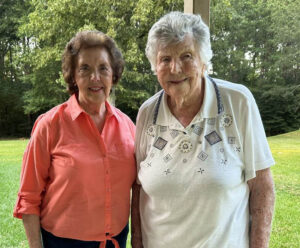
At various times, Estha Mae Coleman Parker and Virginia McKibben Vanlandingham lived and worshiped at the old country church at Pilgrims Rest in Yalobusha County, and now, both of them live only a couple of farms away from each other in Calhoun County. Virginia said that when she and Estha were young, they were “hollering friends.” By that, she meant that one of the youth could holler from her house, across the field, to the other person’s house, and because they lived so very close to each other, the other friend could hear her call. Believe me, these ladies still hear each other call.
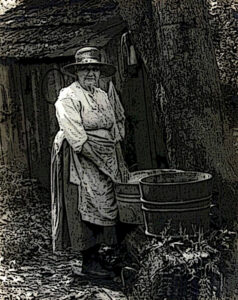
I had previously spent an afternoon with Estha, and I had also talked to Virginia over the phone. During our phone conversation, I asked Virginia if she, as a child, had played any fun games around harvest time. She drew a blank about the question, and to better explain myself to her, I asked whether she had bobbed for apples when she was young. She guffawed and retorted, “No!!!! Water was too scarce back then.” With that phrase in mind, please allow me to add a few thoughts to what I wrote last week about washing clothes years ago. It is important to understand that the chores of yesteryear’s wash days started before the laundering began. First, it was necessary for the would-be laundresses to fetch some precious water.
Virginia said that there was a natural well on the property of her childhood home, and Estha said that her family toted water from a creek. But regardless of where these two families got their water, it still had to be carried to a pot near the house. When the scrubbing was finished, the washerwomen rinsed their clothes in a galvanized tub. With the mention of galvanized tubs, I can add some of my own memories to the story.
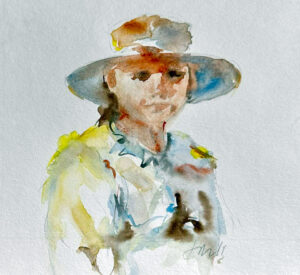
Washerwoman – Jacki Kellum Watercolor Painting
All of her life, my grandmother both washed and rinsed her laundry in galvanized tubs. My grandmother’s wash tubs rested on a small sun porch attached to the back of her house. My grandmother also sewed on that porch, and she made blue calico skirts that she draped around her tubs. Because my grandmother dried her clothes on an outside line, those calico skirts always smelled like rays of raw sunshine and blustering wind on crystal clear days. I loved walking onto my grandmother’s back porch, and when I was a child, I did that often.
You see, my dear grandmother lived only one street away from the house where I was reared. While I was living at home, I visited her at least once every day, and to get there, I usually cut across an alley between our houses, and afterward, I would walk through my grandmother’s garden. First, I swished through a forest of tall, swaying hollyhocks and after that, I floated beneath a huge trellis covered with morning glories. When I was about five, a neighbor boy and I got married beneath that blue-mounded altar. My wedding dress was one of my grandfather’s white work shirts, and my veil was a piece of my grandmother’s delicate crochet.
From the morning glories, I meandered along a line that ran between strawberries and masses of flowers. That path connected me to my grandmother’s back door which opened into her sunny porch. As you read the following poem, keep in mind that I grew up in cotton country. I tell everyone that I grew up in the middle of a cotton patch, and that is not far from the truth.
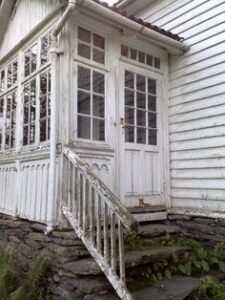
Calico Cotton
I’ve reached the shore
Of my grandmother’s door—
The one from the garden, inside.
Oh, sunny, sweet back room
Of my grandmother’s loom—
The place in the dirt
Of my grandmother’s skirt—
In the lounge of her lap,
Hold me tight, I will nap,
On my grandmother’s porch,
Let me hide.
I am telling you all of this because I always felt safe and loved at my grandmother’s house. My grandparent’s house was my second home, and I realize that my primary purpose for researching the lives and the old buildings in this area is that I am desperately trying to hold on to my own heritage, which is very much like that of the people who live around Water Valley. As Estha and Virginia talked about how their mothers hung their freshly laundered clothes out to dry on a clothesline, I relived the days when my grandmother and my mother did that, too. I’ll provide some background material before I continue.
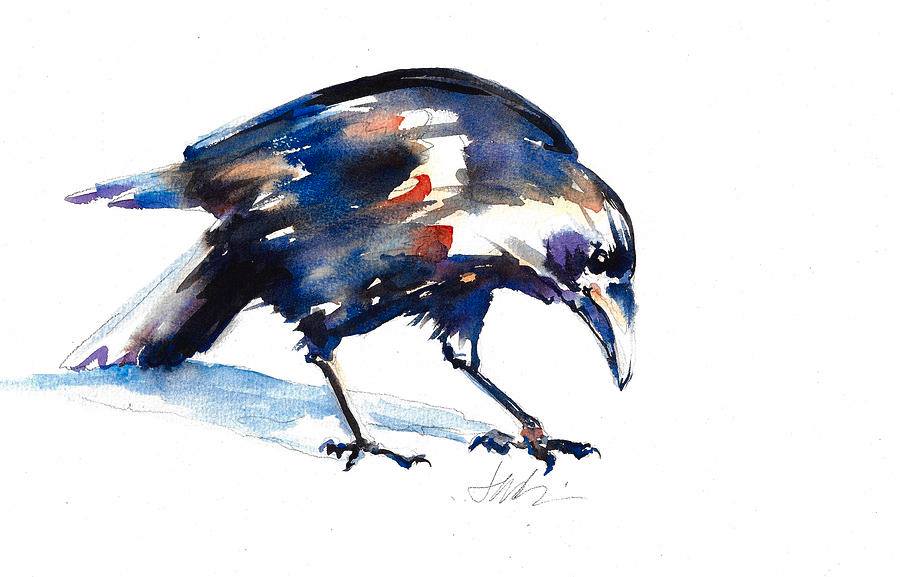
Crow – Jacki Kellum Watercolor Painting
My dad rescued many baby animals and raised them at home. One of his pets was a crow, and the crow’s name was Sam. My dad taught Sam to talk. Well, Sam was a player, and when my mother was hanging her wet clothes outside, Sam would dip down and steal her clothespins. Sometimes, he snatched the clothespins out of my mother’s hands. I’ll never forget the fuss that followed. My mother would run after that bird, waving her arms in the air, and calling out, “Stop it, Sam,” and gleefully, Sam would holler back at her, “Stop, it, Sam. Stop it, Sam. Stop it, Sam.” When I was a child, I would sit on a palette in my yard and watch the show, and I could swear that I heard the clouds in the sky call back to that playful blackbird: “Stop, it, Sam. Stop it, Sam. Stop it, Sam.” The cotton fields rang with laughter. And in that laughter, I heard the voice of God.
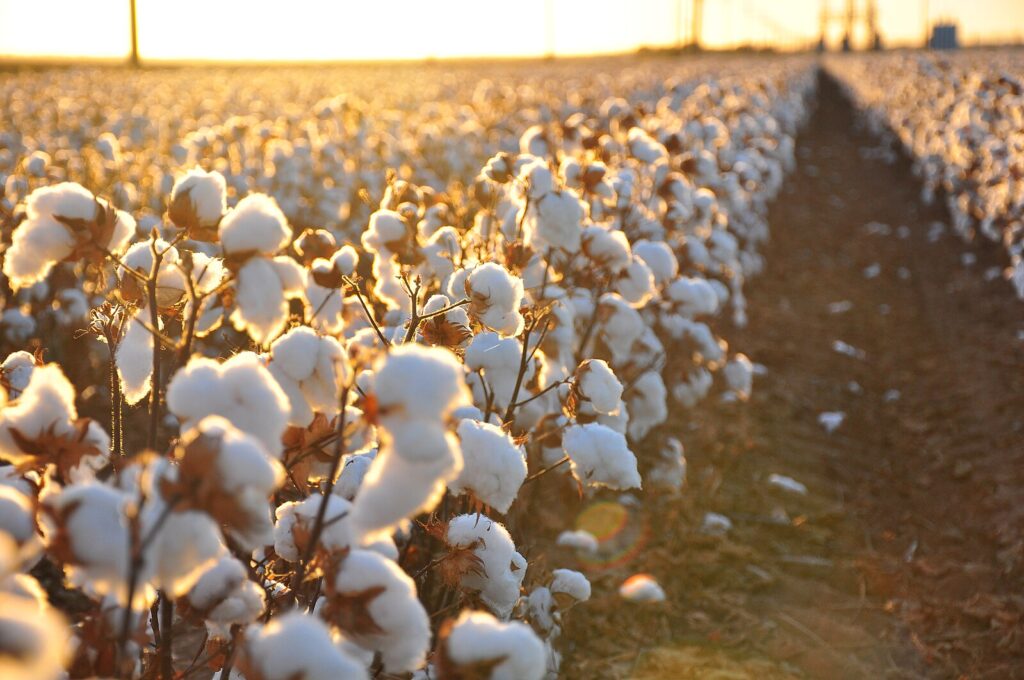
Cotton fields have always been important to me. I was born in 1950, which was before most farmers had mechanized cotton pickers. There were no big cotton plantations with their field hands where I was reared, and to prepare for the cotton harvest, the schools would resume classes in July so that they could dismiss again in September. That’s when the kids would go to the fields and pick the cotton on farms around us. Like most of the other kids in my town, I picked cotton when I was a young child, and as Mary Sue and I have driven around, looking for churches in the wildwood, I have enjoyed watching the cotton plants mature.
To be honest, I hated picking cotton, but I am thankful for the time that I spent thrashing through the fields. In doing so, I experienced the end of an era. Because I know cotton firsthand, I’ll be writing more about it in the coming weeks. But today, while I am talking about listening for the voice of God, I want to add that I also heard God’s voice when I was young, picking cotton.

A large family picked where I did, and they would stretch across about 12 rows. While they pulled fluffy white fibers from the treacherous wooden bolls and loaded it into their sacks, that family would sing hymns. “Amazing grace, how sweet that sound.” Even as a child, I knew that in that family’s singing, I had heard the voice of God. Of course, God speaks most clearly to us through scriptures, but I am thankful that since my childhood, I have learned to listen for Him in other places, too. “God does speak….” Job